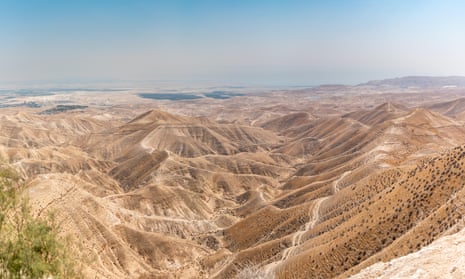A plan by an Israeli group to hold a Burning Man-style event in the deserts of the occupied territories has sparked frustration among Palestinians and dismay from Israeli festival enthusiasts who say it goes against the original event’s founding principles.
The annual gathering in the Nevada desert in the US, with its massive art installations, costumes and symbolic burning of an effigy of “The Man”, has gathered a global following.
In Israel, its official partner, Midburn – which combines the Hebrew word for desert, “midbar”, with “burn” – has been running events, or “burns”, since 2014. But since the group had trouble finding a location in Israeli deserts, several “burners” broke away to form their own, unofficial festival.
Organisers say the Dead Sea Burn event has already received approval by Israel’s military for up to 15,000 people to assemble on land near the border with Jordan, the Dead Sea and the Palestinian city of Jericho. It will still need Israeli police permissions before it can go ahead in April.
Yaron Ben Shoshan, who is a joint-lead on the project, says he has been pushing for Palestinians to attend and argues his efforts are not political, although he understands why people would see it that way.
“The bad side is fighting about the area and arguing with each other and making the gap deeper. The other way of reacting is to say, ‘we have an opportunity here to show our leaders that we as people can communicate and enjoy ourselves together’.”
However, the military has far more restrictive rules for Palestinians who live in the area than it does for Israelis. West Bank Palestinians who would like to attend need first to secure permission from the Israeli army, organisers say. The location at which the event is scheduled to take place belongs to a territory claimed by Israeli settlements, which are often built on land taken from Palestinians. Local Palestinian residents and authorities were not consulted.
The Guardian has contacted the Israeli military for comment.
Saeb Erekat, the secretary general of the Palestine Liberation Organization (PLO), who is also from Jericho, said the invitation to Palestinians to attend was “an insulting statement that unveils the colonialist mentality of the organisers”.
“So they come to occupied territory, to an area where the occupation negates Palestinian development through a network of checkpoints, roadblocks and closed military zones, where our natural resources are stolen and our rights in general are negated, and then they tell us ‘you can attend’ in a closed military area.”
Mohammed al Tamari, a Palestinian farmer who lives near the proposed site, said organisers should have known better.
The festival, he said, would serve only to promote plans by the Israeli government, supported by the Trump administration, to declare the wider area, which comprises up to a third of the West Bank, as part of Israel – a move many states see as an illegal land-grab.
“This is Palestinian land. They have no right in it,” said al Tamari. “And why don’t they ask for permission? They ignore us deliberately.”
Burning Man’s Israeli partner, Midburn, has made it clear it is not associated with the proposed festival. In 2016, the group looked at the opportunity to hold a gathering in the same spot but decided against it to uphold its apolitical stance.
The plan has also led to heated debate in the Israeli festival community as many “burners” argue it goes against the 10 founding principles of Burning Man, including civic responsibility, communal effort and radical inclusion.
“Clearly ‘radical inclusion’ cannot be upheld at this burn, as it excludes members of our own community who will not attend out of political discomfort, not to mention the Palestinian population who will not be permitted to attend,” said Danna Colin, a Tel Aviv-based designer who is one of the heads of the Midburn art department. “A burn is a burn because of its values. That’s what separates it from any other festival.”
That Midburn has managed to thrive in Israel while staying out of politics, she said, was nothing short of a miracle. “With this one sweeping move, it’s so easily damaged,” she added.
Additional reporting by Sufian Taha
